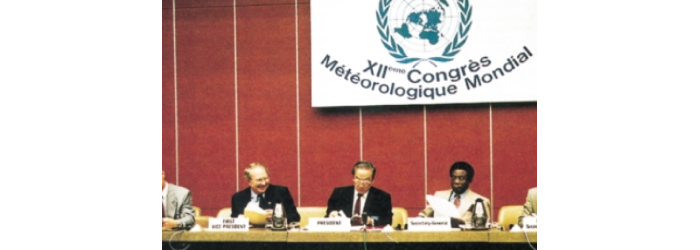PPE Policies, Guidelines and Publications
In this section you can find PPE-related resources about:
High-Level Policies and Guidelines

Guidelines for Public-Private Engagement (2024 edition) are currently available in Arabic, Chinese, English, French, Russian and, Spanish.
Resolution 26 (EC-78) – Guidelines for Public-Private Engagement (edition 2024) in Abridged Final Report of the Seventy-eight Session of Executive Council, 2024: Arabic, Chinese, English, French, Russian and Spanish.
The revisions to the Guidelines were endorsed by Resolution 26 (EC-78), the primary revisions include two parts:
- Changes to the body text of the 2021 edition of the Guidelines, which reflect policy development since EC-72 with implications for PPE, including mainly the WMO Unified Data Policy of Resolution 1 (Cg-Ext(2021)) - WMO Unified Policy for the International Exchange of Earth System Data, and its Annex 3 of Guidelines on the application of the data policy in PPE, and the WMO Strategic Plan 2024–2027 adopted at the nineteenth session of Congress (Cg-19) in 2023, setting the strategic objective of scaling up effective partnerships, including partnerships with the private sector;
- Addition of an annex on a legislative and institutional framework to promote PPE; it provides cases of laws and regulations collected from Members and templates of such a framework.

Resolution 27 (EC-78) – Establish a Code of Ethics between WMO and the Association of the HydroMeteorological and Environmental Industry (HMEI), is available here.

Geneva Declaration – 2019: Building Community for Weather, Climate, and Water Actions in WMO official languages: Arabic, Chinese, English, French, Russian and Spanish
Resolution 80 (Cg-18) – Geneva Declaration – 2019 in Abridged Final Report of the Eighteenth Session of World Meteorological Congress, 2019: Arabic, Chinese, English, French, Russian, and Spanish
The Geneva Declaration 2019 adopted by the WMO Congress provides a strategic direction of expanding the engagement between the public, private and academic sectors and leverage their respective strengths and resources in achieving common goals. The Declaration and the Open Consultative Platform (OCP), launched at the High-Level Round Table during Congress, are the most important manifestations of the WMO’s strategy of engaging the whole community into a concerted response to the global environmental risks.

Guidelines on the Application of the Data Policy in Public-private Engagement (2021) - Annex 3 to Resolution 1 (Cg-Ext(2021)) in Arabic, Chinese, English, French, Russian and Spanish
Resolution 1 (Cg-Ext(2021)): WMO Unified Policy for the International Exchange of Earth System Data in Abridged Final Report of the Extraordinary Session, 2021
The purpose of these guidelines is to promote the implementation of the policy of broadening and enhancing the free and unrestricted international exchange of Earth system data through better sharing of data between the public and private sectors. The guidelines are based on the understanding that applying the free and unrestricted principle depends greatly upon sound, fair, transparent, and stable relations between these two sectors.
Open Consultative Platform

Resolution 79 (Cg-18) – Open Consultative Platform “PARTNERSHIP AND INNOVATION FOR THE NEXT GENERATION OF WEATHER AND CLIMATE INTELLIGENCE” in Abridged Final Report of the Eighteenth Session of World Meteorological Congress, 2019: Arabic, Chinese, English, French, Russian and Spanish
WMO Report of the High-Level Round Table for the Launch of the Open Consultative Platform (OCP-HL-1) (June 2019, Geneva, Switzerland)
Joint Statement of the High-Level Round Table for the Launch of the Open Consultative Platform (OCP-HL-1) (part of the above report)

Summary Report of the High-Level Round Table Session of the WMO Open Consultative Platform (OCP-HL-1) (5-6 June 2020)
The High-Level Round Table of the OCP (OCP-HL-1) was held on 5 and 6 June 2020. The discussions were held in five thematic parts: (1) data and more (shared) data; (2) forecasting and forecasters; (3) demand and supply of services which drive decision-making (4) capacity gaps and; (5) roles, responsibilities and partnerships for common actions. This report summarizes the main perspectives and recommendations arising from the OCP-HL-1 discussions.

Summary Report of the Second High-Level Session of the WMO Open Consultative Platform (OCP-HL-2) (26-27 May 2021)
The Second High-Level Session of the OCP (OCP-HL-2) was held on 26 and 27 May 2021. The discussions were around two themes: (1) the future of weather and climate forecasting, and (2) the future evolution of NMHSs and stakeholders. This report summarizes the main perspectives and recommendations arising from the OCP-HL-2 discussions. The report will be used as a reference by all the stakeholders in global weather and climate enterprises to understand challenges and drivers for change as well as form common visions and collaborative efforts.

WMO Open Consultative Platform White Paper #1 - Future of weather and climate forecasting: Part I - White Paper #1, Part II - Compilation of the PPE WP1 (WMO- No. 1263, 2021); Press release on 1 April 2021
The demand for weather and climate forecast information in support of critical decision-making has grown rapidly during the last decade and will grow even faster in the coming years. Great advances have been made in the utilization of predictions in many areas of human activities. Nevertheless, further improvements in accuracy and precision, higher spatial and temporal resolution, and a better description of uncertainty are needed to realize the full potential of forecasts as enablers of a new level of weather and climate-informed decision-making.

Summary Report of the Third High-Level Session of the WMO Open Consultative Platform (OCP-HL-3) (20 June 2022)
The Third High-Level Session of the OCP (OCP-HL-3) was held on 20 June 2021. The discussions included the launch of White Paper #2 "Future of National Meteorological or Hydrometeorological Services - Evolving Roles and Responsibilities, and three topics: (1) Operating modes and environment, (2) Legislative/institutional framework, and (3) Human resources, Permanent Representatives' role and global and regional cooperation. This report summarizes the main perspectives and recommendations that arose at the OCP-HL-3 discussions. The report will be used as a reference by all the stakeholders in global weather and climate enterprises to understand challenges and drivers for change as well as forming common visions and collaborative efforts.

WMO Open Consultative Platform White Paper #2 - Future of National Meteorological or Hydrometeorological Services: Evolving roles and responsibilities: Part I - White Paper #2, Part II - Compilation of the PPE WP2 (WMO- No. 1294, 2022); Press release on 22 June 2022
This OCP White Paper on the Future of National Meteorological or Hydrometeorological Services - Evolving Roles and Responsibilities has been produced as a collective endeavor of a group of world-leading experts to analyze trends, challenges, and opportunities in a dynamic environment. It is focused on evolving roles, responsibilities, operational scenarios, and partnership mechanisms that define the future and work of NMSs as national institutions and key participants in the global weather, climate, and water ecosystem of stakeholders. The primary objective of this paper is to inform key decisions on the future development of NMSs, consider risks, opportunities, and scenarios for the foreseen institutional, technological, and operational changes, and enable better governance choices to mitigate possible negative impacts. Another objective of this paper is to help set the direction for WMO in its strategic planning process, with the recognition that NMSs play a decisive role in the achievement of long-term goals and strategic objectives.

The Fourth High-Level Session of the Open Consultative Platform (OCP-HL-4) of the World Meteorological Organization (WMO) was held on 26 May 2023 during the nineteenth World Meteorological Congress, the supreme body of WMO. The central theme of the OCP-HL-4 was the UN Early Warnings for All (EW4All) initiative, which was launched in March 2022. The representative of one of the first 30 most at-risk countries, the Permanent Representative of Lao People's Democratic Republic (PDR) with WMO, articulated the challenges and need to be considered when implementing the Executive Action Plan in the Lao PDR and at the local level in general. Furthermore, guest speakers from the private sector presented their ideas and perspectives on contributing to the swift implementation of the EW4All initiative.

Summary Report of the Fifth High-Level Session of the WMO Open Consultative Platform (OCP-HL-5) (13 June 2024)
The Fifth High-Level Session of the Open Consultative Platform (OCP-HL-5) of the World Meteorological Organization (WMO) was held on 13 June 2024 during the seventy-eighth Session of the WMO Executive Council (EC-78). The central theme of OCP-HL-5 was the Public-Private Engagement for Sustainable Satellite Services. The speakers from space agencies, commercial satellite companies, and an association representing the weather industry shared their perspectives on engagement strategies, collaboration models, opportunities, and challenges associated with the increasing demand for and supply of satellite data.
Data

Origin, Impact, and Aftermath of WMO Resolution 40 (John W. Zillman, WMO Bulletin 68 (2), 2019)

Origin, Impact, and Aftermath of WMO Resolution 40 (Public-Private Engagement Publication No.1, 2019)
Summaries and Reports
 | Summary of WMO Questionnaire on Status of Public-Private Engagement in WMO Members (2018) |
 | Decision 73 (EC-68): Summary of the Special Dialogue on Public-Private Partnership in Abridged Final Report of the Sixty-Eighth Session of Executive Council, 2016: Arabic, Chinese, English, French, Russian and Spanish |
 | WMO World Weather Open Science Conference (WWOSC): Report of the Special Joint Panel on the Future of the Weather Enterprise (2014) |
Bulletin Articles
| WMO Anniversaries – Dates and Facts (Dimitar Ivanov, WMO Bulletin 69 (2), 2020) | |
 | Weather and Climate Services: An Increasing Range of Choice for the Public and Private Sector (Adriaan Perrels, WMO Bulletin 68 (2), 2019) |
 | Partnership between Private and Public Sectors in Service Delivery (Neil Gordon, WMO Bulletin 57 (4) - 2008) |
Archive
Guidelines for Public-private Engagement(2021 edition) in WMO official languages: Arabic, Chinese, English, French, Russian and Spanish. Resolution 11 (EC-72): Guidelines for Public-private Engagement (edition 2020) in Abridged Final Report of the Seventy-Second Session of Executive Council, 2020: Arabic, Chinese, English, French, Russian and Spanish. The Guidelines aim to inform and facilitate global, regional, and national actions by the WMO and its Members towards proactive engagement between the public, private and academic sectors, and all stakeholders, resulting in better service to their governments, economy, and citizens. The Guidelines outline and promote principles to maximize the benefits of an inclusive weather enterprise approach. | |
Resolution 33 (EC-70): WMO Policy Framework for Public-Private Engagement in Abridged Final Report of the Seventieth Session of Executive Council, 2018: Arabic, Chinese, English, French, Russian and Spanish |



